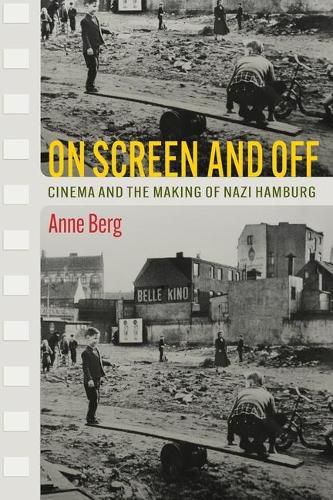Readings Newsletter
Become a Readings Member to make your shopping experience even easier.
Sign in or sign up for free!
You’re not far away from qualifying for FREE standard shipping within Australia
You’ve qualified for FREE standard shipping within Australia
The cart is loading…






On Screen and Off shows that the making of Nazism was a local affair and the Nazi city a product of more than models and plans emanating from Berlin. In Hamburg, film was key in turning this self-styled Gateway to the World into a Nazi city. The Nazi regime imagined film as a powerful tool to shape National Socialist subjects. In Hamburg, those very subjects chanced upon film culture as a seemingly apolitical opportunity to articulate their own ideas about how Nazism ought to work. Tracing discourses around film production and film consumption in the city, On Screen and Off illustrates how Nazi ideology was envisaged, imagined, experienced, and occasionally even fought over.
Local authorities in Hamburg, from the governor Karl Kaufmann to youth wardens and members of the Hamburg Film Club, used debates over cinema to define the reach and practice of National Socialism in the city. Film thus engendered a political space in which local activists, welfare workers, cultural experts, and administrators asserted their views about the current state of affairs, articulated criticism and praise, performed their commitment to the regime, and policed the boundaries of the Volksgemeinschaft. Of all the championed people’s products, film alone extended the promise of economic prosperity and cultural preeminence into the war years and beyond the city’s destruction. From the ascension of the Nazi regime through the smoldering rubble, going to the movies grounded normalcy in the midst of rupture.
$9.00 standard shipping within Australia
FREE standard shipping within Australia for orders over $100.00
Express & International shipping calculated at checkout
On Screen and Off shows that the making of Nazism was a local affair and the Nazi city a product of more than models and plans emanating from Berlin. In Hamburg, film was key in turning this self-styled Gateway to the World into a Nazi city. The Nazi regime imagined film as a powerful tool to shape National Socialist subjects. In Hamburg, those very subjects chanced upon film culture as a seemingly apolitical opportunity to articulate their own ideas about how Nazism ought to work. Tracing discourses around film production and film consumption in the city, On Screen and Off illustrates how Nazi ideology was envisaged, imagined, experienced, and occasionally even fought over.
Local authorities in Hamburg, from the governor Karl Kaufmann to youth wardens and members of the Hamburg Film Club, used debates over cinema to define the reach and practice of National Socialism in the city. Film thus engendered a political space in which local activists, welfare workers, cultural experts, and administrators asserted their views about the current state of affairs, articulated criticism and praise, performed their commitment to the regime, and policed the boundaries of the Volksgemeinschaft. Of all the championed people’s products, film alone extended the promise of economic prosperity and cultural preeminence into the war years and beyond the city’s destruction. From the ascension of the Nazi regime through the smoldering rubble, going to the movies grounded normalcy in the midst of rupture.